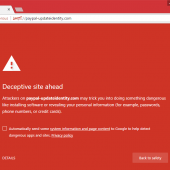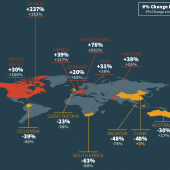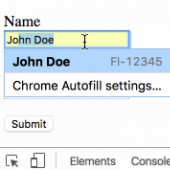-
14,766 Let's Encrypt SSL Certificates Issued to PayPal Phishing Sites
During the past year, Let's Encrypt has issued a total of 15,270 SSL certificates that contained the word "PayPal" in the domain name or the certificate identity. Of these, approximately 14,766 (96.7%) were issued for domains that hosted phishing sites.
- March 24, 2017
- 07:31 PM
 0
0
-
A Corporate Inbox Receives 4.3 Times More Malware Than a Regular Inbox
Corporate email addresses are 4.3 more likely to receive malware compared to personal accounts, 6.2 times more likely to receive phishing lures, and 0.4 times less likely to receive spam.
- February 17, 2017
- 04:05 PM
 1
1
-
Mysterious Girl at the Heart of Cyber-Espionage Campaign
During the past year, social media profiles belonging to a girl named Safeena Malik have been at the heart of a series of phishing attacks that have targeted journalists and activists investigating Qatari migrant worker labor issues.
- February 14, 2017
- 01:35 PM
 0
0
-
High-End Phishing Kit Automates Attacks on PayPal Accounts
Security researchers from Proofpoint have come across a sophisticated phishing kit that automates the process of building and deploying high-end phishing pages, and which is extremely efficient at collecting login credentials and user details from PayPal users.
- February 07, 2017
- 04:30 PM
 0
0
-
Clever Phishing Trick You Need to Be Aware Of
One trick, first seen in June 2016, was observed again this past month. This clever phishing attack relies on telling users they received an important or secure file, and they need to visit a web page to view it. The real trick takes place on the crook's page, which shows a blurred out document on the background.
- January 09, 2017
- 06:11 AM
 0
0
-
Browser Autofill Profiles Can Be Abused for Phishing Attacks
Browser autofill profiles are a reliable phishing vector that allow attackers to collect information from users via hidden fields, which the browser automatically fills with preset personal information and which the user unknowingly sends to the attacker when he submits a form.
- January 06, 2017
- 03:22 PM
 2
2
-
As Bitcoin Price Surges, Phishing Attacks on Cryptocurrency Wallets Intensify
Bitcoin price surge reverberates through cybercriminal landscape, as cyber-criminals ramp up phishing attacks against Bitcoin users.
- December 23, 2016
- 06:10 AM
 0
0
-
Wannabe Crooks Fooled by Backdoored Phishing Kits Advertised on YouTube
There's a growing trend in the cybercrime landscape, and the trend is for malware authors to distribute backdoored malware using promotional videos and hacking tutorials on YouTube.
- November 25, 2016
- 01:00 PM
 0
0
-
Fake Prisma Apps Threaten 1.5M Android Users with Ads, Data Theft
Fake versions of the Prisma application for Android threaten as many as 1.5 million users with unwanted advertisements and data theft.
- August 05, 2016
- 09:00 AM
 0
0
















